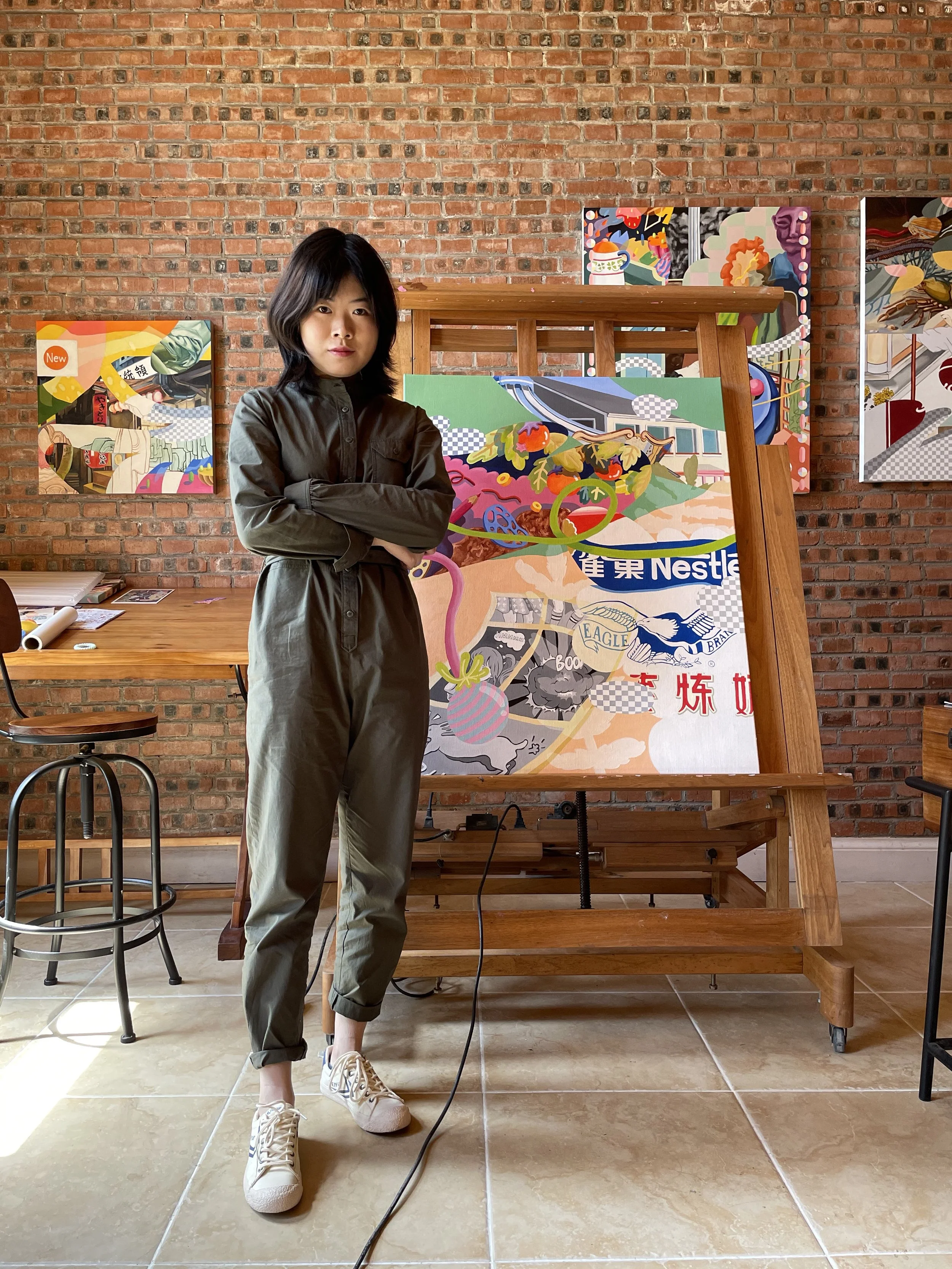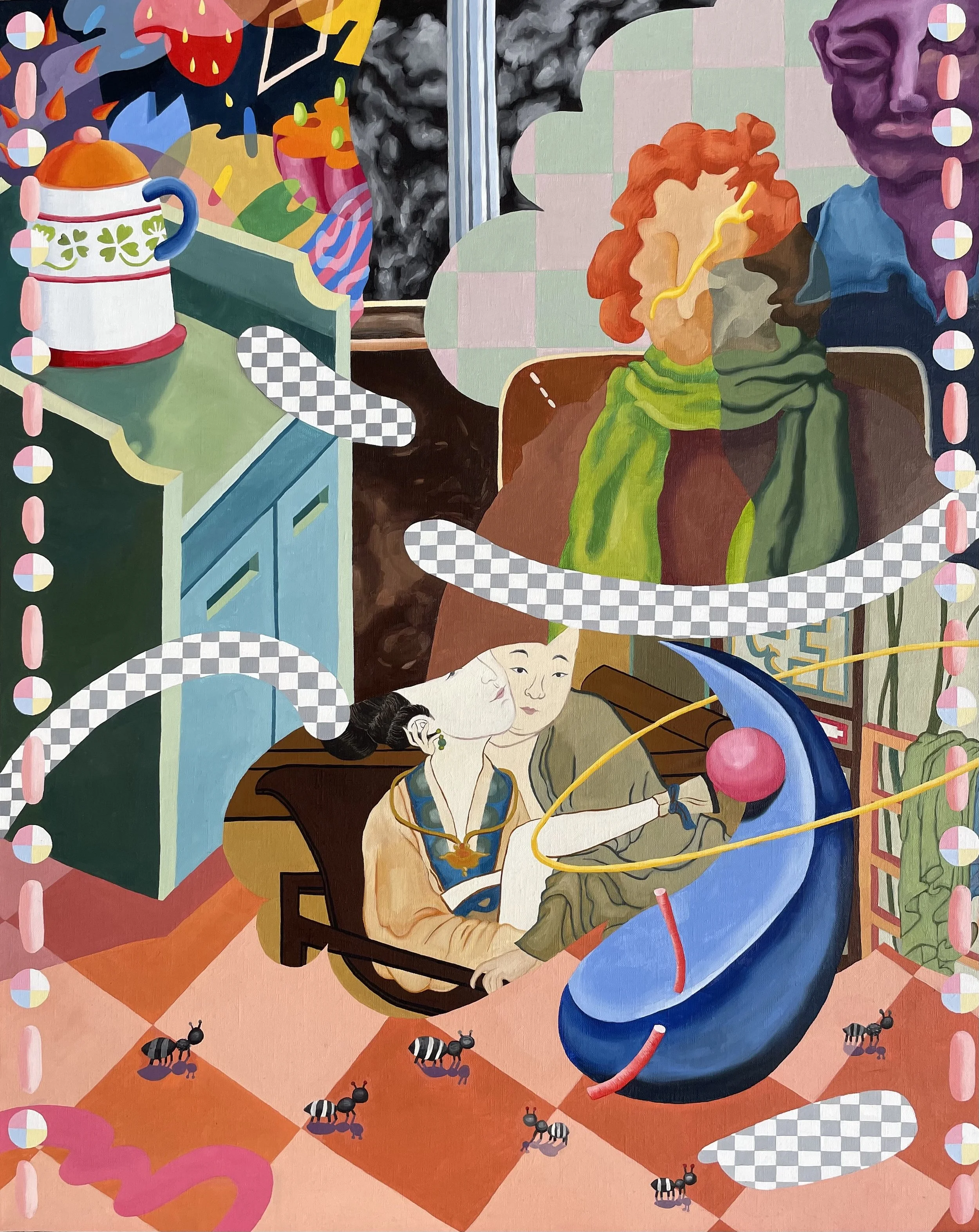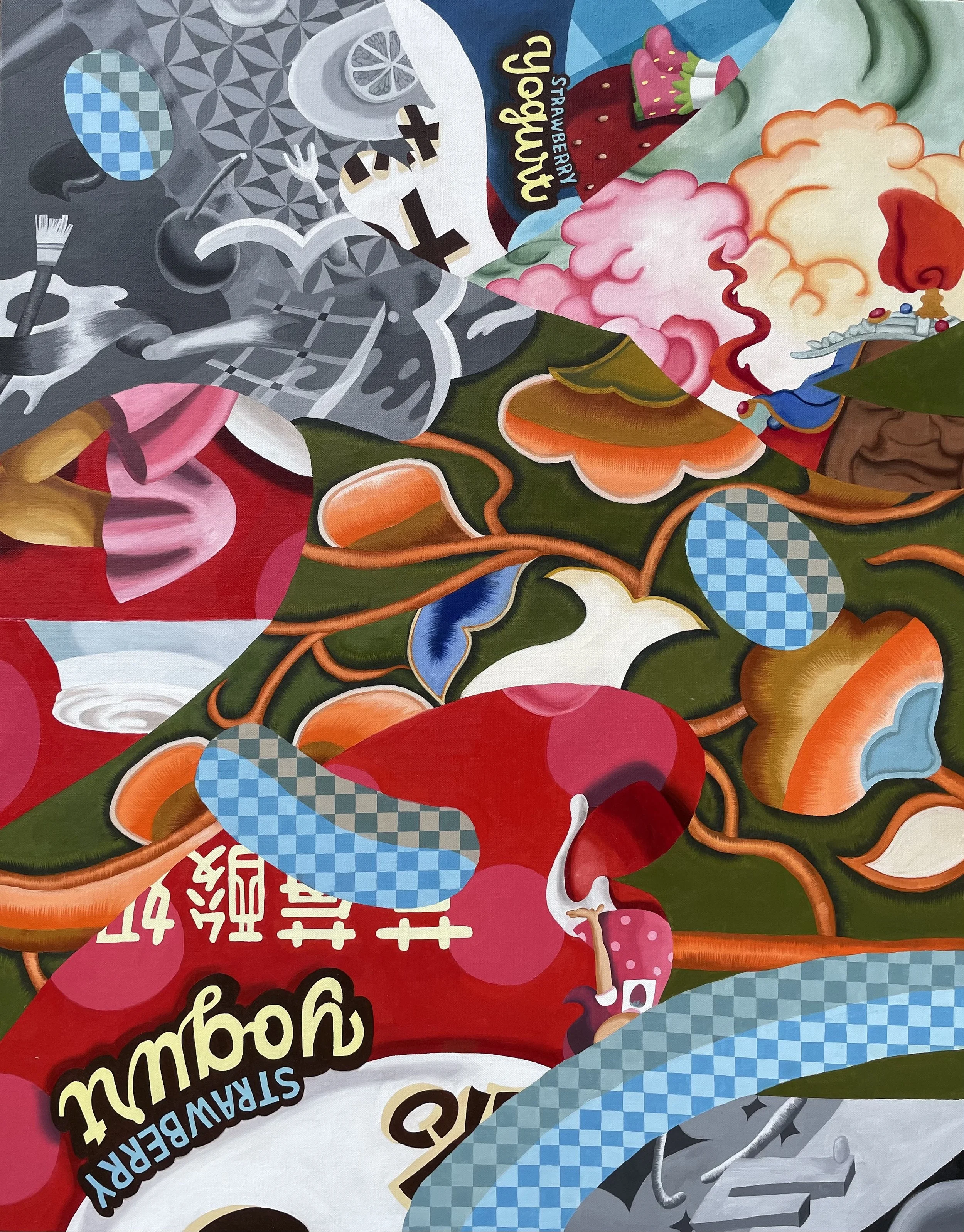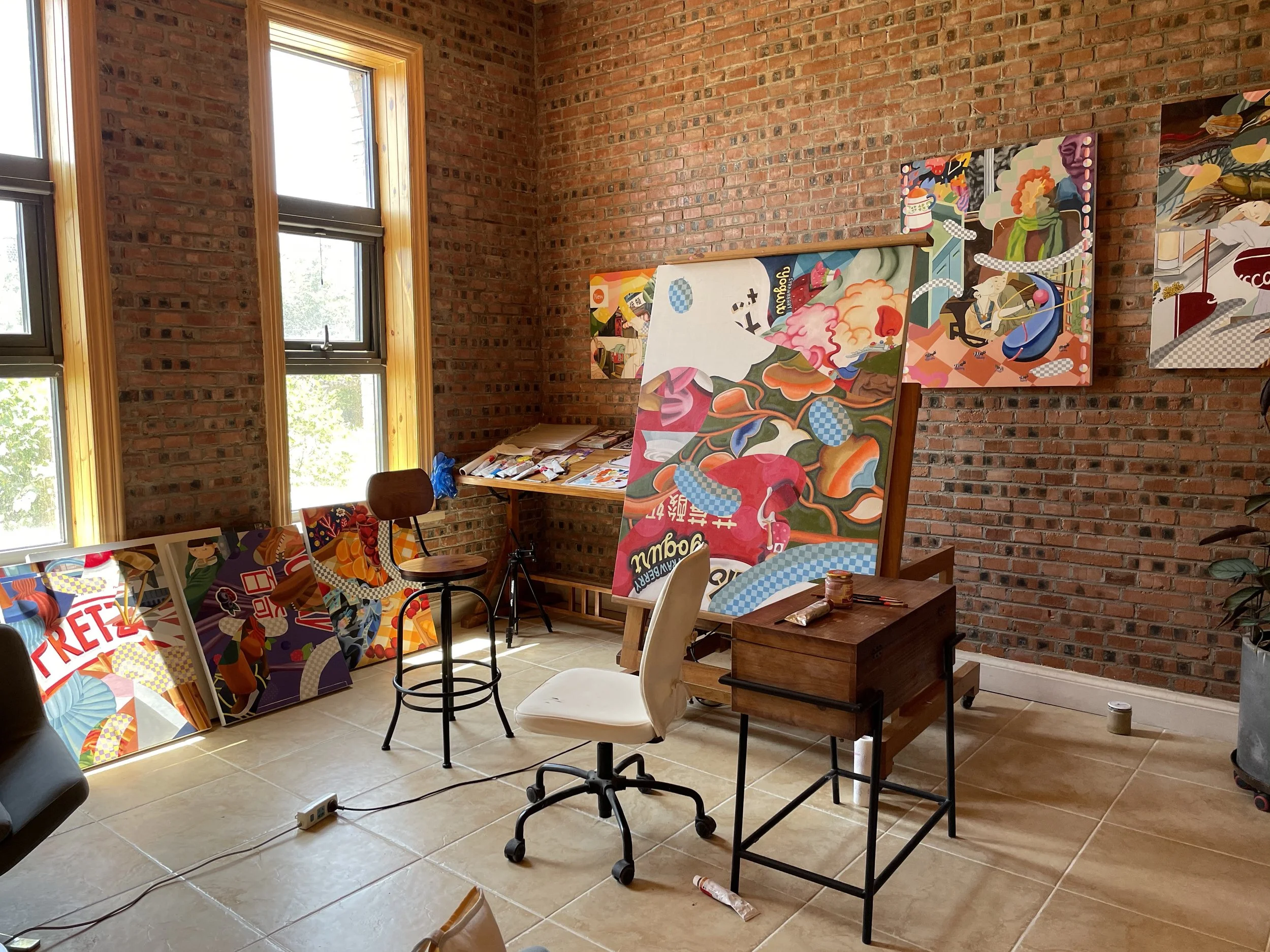Interview with Ziping Wang
Ziping Wang
Ziping Wang was born in 1995 in Shenyang, China. Her distinctly fragmented and colour-saturated artworks seek to highlight the contemporary phenomenon of information overload, while chiming with sensory memory triggers through depictions of children’s toys, logos and food packaging.
Ziping is interviewed by Angeliki Kim-Jonsson, who Is the founder of DYNAMISK Independent Curating and Art Advisory. Angeliki works as an Independent Curator and Art Advisor on a multitude of curatorial and art advisory projects, studio visits, workshops, art talks and tours.
INTERVIEW WITH ZIPING WANG AND ANGELIKI KIM-JONSSON
Angeliki: Tell me more about you!
Ziping: I was born in 1995 in the Northeast side of China. My father is an artist, I grew up in his studio with canvas rolls and paint buckets laying around. My mother was always frustrated that my clothes had some uncleanable paint stains. I went to United States to study art when I was 17 years old and basically stayed there since the end of 2020. I am currently back in my hometown in China, enjoying every second of my time with family and painting.
Ziping Wang
Melting in your Paperhouse, 2021
Oil on canvas, 80 x 100 cm
Angeliki: How and where do you find inspiration?
Ziping: I find inspiration from attractive designs, whether it is food packaging, patterns for cloth, or advertisements. I love saturated colors and things that are nostalgic to my personal experience. I will print the images out and try to make a paper collage first, see how each shape, line, and color interact with another, the whole experience is almost like trying to solve a jig-saw puzzle.
Angeliki: How do you work? Systematically? With music? Whilst dancing? Is your studio messy? Or in order? Paint me the scene!
Ziping: I normally focus on one painting at a time, but if some of my painting requires unreasonable drying time, I will be working on two at the same time. When working with large scale paintings, rather than making bold marks that swipe across the canvas surface, I actually use a medium size brush to gradually fill in the marks. Bold marks seem intimidating, I am trying to manage everything under my capacity. My studio is clean compared to the stereotypical artist studio one might imagine, I can only allow overwhelmingness happen on my canvas, not in my studio.
Angeliki: What is your favorite quote?
Ziping: I was quite introverted as a kid, my school reports always wrote something like “she is quiet, obedient, and scared to talk in class.” I always knew that I want to share the things I saw, experienced, and remembered. Since talking was not the best option for me at the time, I started to write and paint. Therefore, my favorite quote is from David Hockney: “what an artist is trying to do for people is bring them closer to something, because of course art is about sharing. You wouldn’t be an artist unless you want to share an experience, a thought.”
Angeliki: How has your practice developed/ changed over the years? Do you think it’s important for artists to experiment or do you think an artist should stay with one style?
Ziping: I think in grad school I experimented with a lot of different mediums and subject matters, then in the last semester I turned back to the graphic images that always haunted me since day one.
Ziping Wang
The Snowflake that Comes Alive, 2021
Oil on canvas, 60 x 80 cm
I think it is absolutely important to experiment, and to outperform everyone’s expectation. Style is different from substance. The works will still feel cohesive even the style is different because the artists experience stays the same and the artists’ way of observing is the same as well.
Angeliki: If you could own a work of art from any artist and any art movement which one would it be and why?
Ziping: Among all the amazing artworks, I think I will choose On Kawara’s date painting, the specific one on my birthday. I always found his practice very contemplative and because of his way of turning painting into a merely mechanical practice, painting become this vessel for the transient time: time containing on a flat surface. By owning that specific piece of his painting, my timeline intertwined with his, and isn’t it fascinating?
Angeliki: Can you tell me about some up-coming exhibition and or future projects?
Ziping: I will be participating the Art021 art fair in Shanghai in November, which will be my first in person art fair since the pandemic. In the same month, I will be in a group exhibition with Peres Project in Berlin, and In January of 2022, I will be showing with Galerie Marguo in Paris, I really hope I can be there physically, Paris is such a wonderful city.
Angeliki: What skills does a contemporary artist need today? If you could go back and give your young self any advice what would that be?
Ziping: For me, if one put efforts and time in, one can acquire any skill. But being a contemporary artist needs more than skills: one needs to believe in oneself when no one does, one needs to focus on the works themselves when the commercial side of things starts to flood in.
Ziping Wang
Studio image, 2021
I am not going to give my young self any advice because she will not listen to me anyway. She is too stubborn and will probably think I am old and a lunatic.
Angeliki: Tell me more about the selection of titles, how does an Artist choose a title and in some cases not?
Ziping: I love reading labels when visiting museums, therefore I always feel disappointed when I see some “Untitled” labels on the wall. For me it is almost like a wasted opportunity.
I have a quite unusual way of choosing titles. I have a small notebook containing the proposed titles for the upcoming paintings. Titles are recorded from random thoughts from daily life and looks like fragmented sentences from poems. When a batch of paintings are finished, I will sit in my studio and pair the painting with a title from the notebook. So, the title and painting almost exist in a parallel worlds where they have no relationship with one another, and I literally tie them up when everything is accomplished.




